Main Point
Artificial Intelligence (AI) plays a significant role in early cancer diagnosis by analyzing vast amounts of medical data quickly and accurately. AI algorithms can detect patterns in medical images, such as X-rays, MRIs, and CT scans, aiding radiologists in identifying potential cancerous lesions at an early stage. Moreover, AI-powered tools can analyze genetic and molecular data to identify specific markers associated with cancer, enabling early detection and personalized treatment plans. These advancements in AI technology enhance the speed and precision of cancer diagnosis, leading to better outcomes for patients.
4 Salient Points
Artificial Intelligence (AI) in oncology involves the application of advanced algorithms and machine learning techniques to analyze complex biological data, medical images, and clinical records in the field of cancer research and treatment. AI plays a crucial role in various aspects of oncology, including early cancer detection, personalized treatment plans, drug discovery, and predicting patient outcomes. By processing large datasets and identifying patterns, AI enables oncologists to make more informed decisions, leading to improved diagnosis, targeted therapies, and ultimately better patient care.
In the context of health care, there are electronic health care records (EHR), radiological data, digital pathology, and multi-Omic data. These different types of health care data play a vital role in advancing medical research, diagnosis and treatment. Artificial intelligence and machine learning technologies are increasingly used to analyze and extract valuable insights from these data types, leading to health care and personalized medicine.
The clinical application of artificial intelligence includes a wide range of uses in the health care industry, which has revolutionized patient care, diagnosis, treatment and research. Including disease diagnosis and prediction, medical imaging analysis, drug discovery and development, personalized treatment plan, health monitoring and predictive analysis, natural language processing (NLP), virtual health assistant and telemedicine. These clinical applications of AI contribute significantly to improving patient outcomes, increasing efficiency in healthcare delivery, and advancing medical research and innovation.
The promise of healthcare AI comes with several challenges, including ethical considerations, algorithmic fairness, data bias, governance and security. Developing ethical principles and frameworks is the subject of significant ongoing work in healthcare AI. Addressing these challenges and pursuing future directions such as explainable artificial intelligence (XAI), AI-driven drug discovery, and artificial intelligence-enhanced health care workforce will shape the pattern of artificial intelligence in the health care field, improve patient outcomes, strengthen health care services, and promote innovation in the next few years.
🎯Research Appendix

Clinical Applications of AI in early cancer diagnosis

Challenges and possible solutions to improve the robustness of AI models in the future

